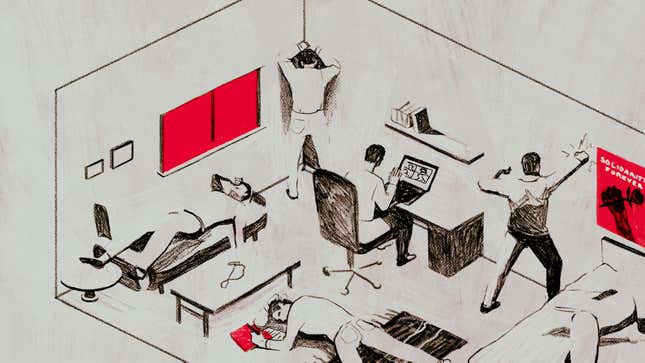Suspended Between Love and Rage
Latest
Image: Angelica Alzona/GO Media
Long before the order came down to “shelter in place,” my brain was telling me to retreat. Last year was not a good year for me. I struggled for work; I had my heart broken. My instinct was to isolate; to distance. What a fortunate turn, then, to be given a state-sanctioned reason to do so. To forego obligations and commitments and responsibilities. I can allow my worst habits to overtake me, following self-destructive impulses and inflicting pain in ways I think I can manage. It won’t help, but I’d do it anyway.
I’ve never been more alone, but I don’t feel lonely. All around me, people seemingly in every community I have ever been a part of are reaching across the distance, seeking to close it: My union siblings, my comrades in the Democratic Socialists of America, tenant and labor activists I’ve met in the course of my reporting and my own organizing work. Burned out after two and a half years in DSA, I’d taken a break from the organization since last summer but the pandemic has given me no choice but to recommit. I have been welcomed with open (digital) arms. Friends who were not especially political, or who didn’t think of themselves as such, are now doing mutual aid work, talking about the pandemic as not just a health crisis but a political crisis. Whether out of conviction, desperation, or necessity (or some combination of the three), people are organizing—for rent and labor strikes, for their friends, families, and neighbors, for their survival.
But video calls, group chats, and email threads are no replacement for meeting in person. There is no replacement for seeing how we share space with one another; for watching the unconscious changes in people’s bodies as they grapple with the questions that shape their lives; for joining voices on a picket line, or taking the streets in a march, or running from the cops. You cannot ask someone to take a risk for you if you don’t have their trust, and it is hard to gain someone’s trust without sharing embodied experiences.
-

-

-

-

-

-

-

-

-

-

-

-

-

-

-

-

-

-

-

-

-

-

-

-

-

-

-

-

-

-

-

-

-

-

-

-

-

-

-

-








































